Effective Strategies for Saving Alzheimer’s Memories
Discover effective strategies for saving and sharing memories of Alzheimer’s patients to ensure their legacy lives on for future generations.
Understanding Alzheimer’s and the impact it has on individuals and their families is crucial. This neurodegenerative disease affects millions of people worldwide, and it is important for families and caregivers to have a deep understanding of its nature and progression.
In this blog post, we will explore effective strategies for saving and sharing the memories of Alzheimer’s patients. By preserving these memories, we can ensure that their legacy lives on for future generations.
Understanding Alzheimer’s
Alzheimer’s disease is a complex and devastating neurodegenerative condition that impacts not only memory, thinking, and behavior but also the overall quality of life for individuals affected by it. The accumulation of abnormal protein deposits in the brain, known as plaques and tangles, disrupts the communication between brain cells and impairs cognitive function.
As Alzheimer’s progresses, it unfolds in stages, beginning with subtle signs of mild cognitive impairment that may be overlooked or attributed to normal aging. However, these early symptoms, such as memory lapses, confusion, and difficulties with problem-solving, gradually worsen over time, eventually leading to profound dementia. Tasks that were once routine and effortless become challenging, and individuals may struggle with basic activities like speaking, eating, and maintaining personal hygiene.
While Alzheimer’s predominantly affects older adults, it is crucial to recognize that it is not an inevitable part of aging. In fact, the disease can also manifest in younger individuals, albeit less frequently. Regardless of age, the impact of Alzheimer’s on individuals and their families is profound, requiring a comprehensive approach to care and support.
Impact on Individuals and Families
In addition to the emotional challenges, Alzheimer’s can also pose significant financial and logistical burdens. The cost of medical care, medications, and long-term care facilities can be exorbitant, placing a strain on families’ finances. Caregivers often have to make adjustments to their work schedules or leave their jobs entirely to provide the necessary care for their loved ones, leading to financial instability and career disruptions.
Moreover, the toll of Alzheimer’s extends beyond just the financial and emotional aspects. It can also bring about a sense of isolation and exhaustion for caregivers, who may find themselves navigating the complexities of the disease alone. The constant demands of providing care, managing medications, and dealing with behavioral changes can be physically and mentally draining, often leading to caregiver burnout.
Furthermore, the challenges of coordinating care, navigating the healthcare system, and ensuring the safety and well-being of their loved ones can be overwhelming for families. The need for round-the-clock supervision and support can disrupt daily routines and strain relationships, adding an additional layer of stress to an already challenging situation.
Overall, the impact of Alzheimer’s on individuals and their families is multifaceted, requiring a holistic approach to care and support. By acknowledging and addressing the emotional, financial, and logistical challenges that come with the disease, families and caregivers can better navigate the journey ahead with compassion, resilience, and understanding.
Saving Memories for Future Generations
Another innovative strategy for preserving memories of Alzheimer’s patients is through the use of art therapy. Engaging individuals in creative activities such as painting, drawing, or crafting can not only stimulate their cognitive function but also provide a means of expression and communication. Art therapy allows individuals to tap into their emotions and memories in a non-verbal way, creating a visual representation of their inner thoughts and experiences.
Furthermore, creating a digital memory bank can also be a valuable tool for saving and sharing memories. By digitizing photographs, documents, and other memorabilia, families can create a virtual archive that can be easily accessed and shared with relatives and future generations. This digital repository serves as a convenient way to preserve memories and ensure that they are not lost over time.
Moreover, incorporating storytelling into daily interactions can help in preserving memories in a meaningful way. Encouraging individuals to share their life stories, experiences, and wisdom with loved ones can create a sense of connection and continuity. By listening to these stories and passing them down through generations, families can honor the legacy of their loved ones and keep their memories alive for years to come.
Preserving Memories with Meet Jane
Meet Jane is a unique platform that supports Alzheimer’s patients by recording and preserving their most valuable memories. Through personalized interviews and conversations, Meet Jane captures the essence of the individual’s life experiences, stories, and wisdom.
By using Meet Jane, Alzheimer’s patients can share their memories and life stories with their families and future generations. These recordings serve as a precious keepsake and a way to ensure that their legacy lives on. Meet Jane offers a compassionate and understanding approach to preserving memories, providing comfort and support to both patients and their loved ones.
With the help of Meet Jane, the memories of Alzheimer’s patients can be cherished and shared, creating a lasting impact for generations to come. Schedule a FREE call today.
